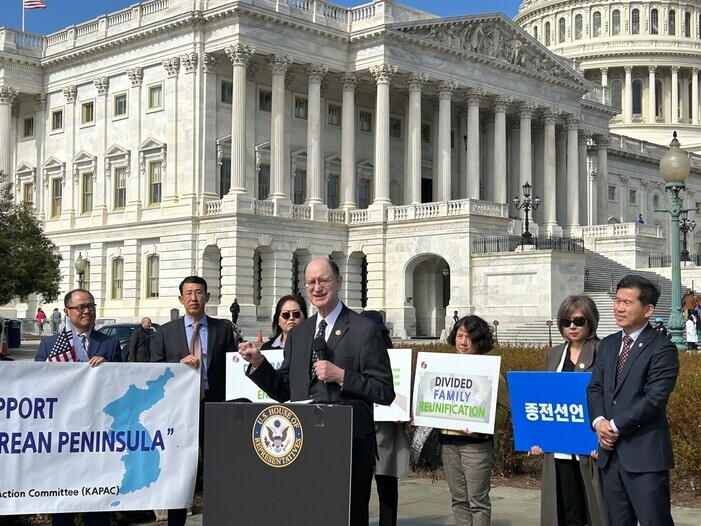hankyoreh
Links to other country sites 다른 나라 사이트 링크
US lawmakers reintroduce bill to put formal end to Korean War

A bill that promotes efforts to end the Korean War and establish a US-North Korea liaison office has been reintroduced in the 118th US Congress.
The proposal is being led by Rep. Brad Sherman, a senior member of the House Foreign Affairs Committee. Sherman held a press conference on Wednesday where he announced that he was reintroducing the bill together with 19 other members of Congress.
Known commonly as the “Peace on the Korean Peninsula Act,” the bill was first introduced in 2021, during the last session of Congress, and received 46 signatures from both Democrats and Republicans, but ended up being scrapped when that congressional session ended.
The bill calls for the US to declare an end to the Korean War between the South, North, and US; to pursue a binding peace agreement; and for both the US and North Korea to establish liaison offices. The bill also calls for the current travel ban barring US citizens from traveling to North Korea to be reviewed for separated families living in the US.
“The continued state of war on the Korean Peninsula does not serve the interests of the United States nor our constituents with relatives in North and South Korea,” Sherman said. “Serious, urgent diplomatic engagement is needed to achieve peace between North and South Korea.”
Regarding how the bill was being reintroduced on March 1, which marks the anniversary of a massive movement for Korean independence from Japanese colonial rule in 1919, Sherman expressed his hope that the day would also come to be known as “a day where we take a step toward peace in the 21st century of the Korean Peninsula.”
Addressing critics of the bill, Sherman also made it clear that “this is not a bill designed to cause America to withdraw its defense commitment, it is a bill designed to take one step forward toward peace on the Korean Peninsula,” adding that he doesn’t see this bill as a “concession” to the North.
The bill was co-sponsored by 18 other members of Congress, including Korean American lawmakers Andy Kim and Marilyn Strickland, as well as lawmakers on both sides of the aisle including Ro Khanna, Cori Bush, Ilhan Omar, and Republican Congressman Andy Biggs.
Casey Kwang-chul Choi, executive president of the Korean American Public Action Committee (KAPAC) also spoke at the press conference that day.
“This bill should be treated in a totally bipartisan way,” Choi said, adding that “I really hope that members of Congress, on both sides of the aisle, will look at this bill and [offer their] full support.”
Meanwhile, on the same day, the US Treasury Department imposed additional sanctions on individuals and companies that it accused of illicitly generating foreign currency for the North Korean government. Both the Chilsong Trading Corporation and Korea Paekho Trading Corporation were sanctioned.
According to the Treasury Department, the Chilsong Trading Corporation was being used by North Korea to earn foreign currency and collect intelligence while the Korea Paekho Trading Corporation is accused of earning foreign currency through conducting art and construction projects throughout the Middle East and Africa.
The Treasury Department explained that Hwang Kil-su and Pak Hwa-song, who have also been sanctioned, established a company in the Democratic Republic of Congo to earn revenue from construction and statue-building projects with local governments.
For years, North Korea has been earning foreign currency through the construction of large statues in several African countries. The UN banned the import of North Korean statues through Resolution 2321 back in 2016.
By Lee Bon-young, Washington correspondent
Please direct questions or comments to [english@hani.co.kr]

Editorial・opinion
![[Column] Park Geun-hye déjà vu in Yoon Suk-yeol [Column] Park Geun-hye déjà vu in Yoon Suk-yeol](https://flexible.img.hani.co.kr/flexible/normal/500/300/imgdb/original/2024/0424/651713945113788.jpg) [Column] Park Geun-hye déjà vu in Yoon Suk-yeol
[Column] Park Geun-hye déjà vu in Yoon Suk-yeol![[Editorial] New weight of N. Korea’s nuclear threats makes dialogue all the more urgent [Editorial] New weight of N. Korea’s nuclear threats makes dialogue all the more urgent](https://flexible.img.hani.co.kr/flexible/normal/500/300/imgdb/original/2024/0424/7317139454662664.jpg) [Editorial] New weight of N. Korea’s nuclear threats makes dialogue all the more urgent
[Editorial] New weight of N. Korea’s nuclear threats makes dialogue all the more urgent- [Guest essay] The real reason Korea’s new right wants to dub Rhee a founding father
- [Column] ‘Choson’: Is it time we start referring to N. Korea in its own terms?
- [Editorial] Japan’s rewriting of history with Korea has gone too far
- [Column] The president’s questionable capacity for dialogue
- [Column] Are chaebol firms just pizza pies for families to divvy up as they please?
- [Column] Has Korea, too, crossed the Rubicon on China?
- [Correspondent’s column] In Japan’s alliance with US, echoes of its past alliances with UK
- [Editorial] Does Yoon think the Korean public is wrong?
Most viewed articles
- 1[Column] Park Geun-hye déjà vu in Yoon Suk-yeol
- 2[Guest essay] The real reason Korea’s new right wants to dub Rhee a founding father
- 3Why Korea shouldn’t welcome Japan’s newly beefed up defense cooperation with US
- 4[Column] ‘Choson’: Is it time we start referring to N. Korea in its own terms?
- 5Will NewJeans end up collateral damage in internal feud at K-pop juggernaut Hybe?
- 6Senior doctors cut hours, prepare to resign as government refuses to scrap medical reform plan
- 7New AI-based translation tools make their way into everyday life in Korea
- 8Thursday to mark start of resignations by senior doctors amid standoff with government
- 9N. Korean hackers breached 10 defense contractors in South for months, police say
- 10Kim Jong-un expressed ‘satisfaction’ with nuclear counterstrike drill directed at South